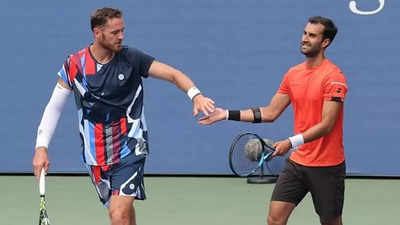While settled is not a space athletes would choose for themselves given that the race is all about moving forward, it’s equitable usage in the world of doubles and partnerships. Ask Yuki Bhambri.
The 32-year-old, mid-career in the two-man team game, played alongside seven partners before settling with the 6-ft-8 Albano Olivetti with whom he contested 16 tournaments in 2024, making four finals and winning two titles, and finishing the year with a top-50 ranking for the first time in his career.
“Four finals is good effort,” Bhambri said. “I don’t think this was a fantastic season, but from where I was in January to where it ended, it’s good. It’s nice to start a season with an existing partnership, that gives us a little bit of an edge.”
Bhambri and Olivetti have Brisbane and Adelaide in their plans before the Australian Open in January.
The Indo-French combine did well in the ATP 250s but are yet to break through in the higher category events.
“We’re still finding our feet in bigger events, in some matches we had chances, but some others we were just blown away,” Bhambri said. “This season was more of a learning experience we can do better in the next season thanks to all that we have learnt.”
Bhambri, who finished the season with an individual doubles ranking of No. 48, did something he hasn’t done in the last five years, even when his body was broken and his spirits were low. In November he lined up a group of friends for an end-of-season holiday to Norway, ticking off the Northern Lights, which has long been on his bucket list.
“We were there for a week, three cities — Trondheim, Lofoten and Oslo. It was a nice break, a lot of snow, wind and layering (clothing),” Bhambri said, adding, “This was a mixed group, six of us. The good thing that came out of being injured (end of 2018 to early 2022) is that I got to spend a lot of time at home, I became social. I had the opportunity to meet some cool people outside of tennis.”
“This holiday happened at a good time, I had a good season, that’s reason to celebrate. Some of the others in the group were also celebrating anniversaries and milestone birthdays so it was just nice,” Bhambri said.
The 32-year-old, who was ranked No.1 in the juniors, winning boys singles title in the 2009 Australian Open, said his biggest takeaway from the season was patience.
“I remember in January and February, I was really rattled. I was hoping to kick on to the next level… and not having those wins initially was tough,” he said. “Doubles is very fast-paced and unpredictable. You could be going home happy or sad depending on one point literally. I hadn’t really experienced that roller-coaster of emotions before.”
“I continued to do the work and play the matches with a positive frame of mind, but I do remember going into some events earlier on where you sort of doubted yourself a little bit. I wondered if I belonged in this level or not,” he said.
Bhambri shifted to doubles after sitting out three seasons, save for a couple of tournaments, struggling with tendonitis on his right knee.
“In singles you can see who the better player is at times,” he said. “In doubles you could bring all the right things to the court and still end up on the losing side.”
Bhambri, who climbed to a career best No. 83 in singles in April 2018, learned the importance of being ‘level-headed’ while navigating the storm of competition. It doesn’t always add up in match play, but it is important to persevere.





